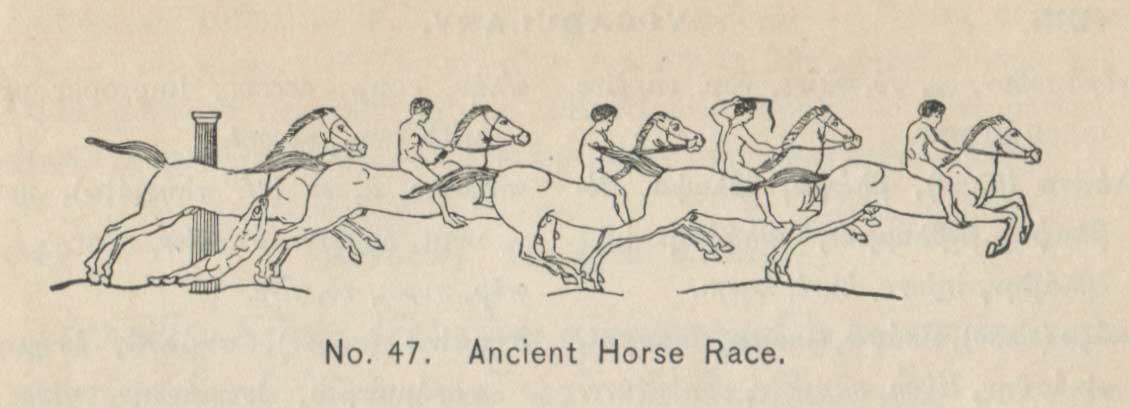THE FIRST GREEK BOOK
BY JOHN WILLIAMS WHITE, PH.D, LL.D., LITT.D.
Professor Of Ancient Greek At Harvard University
This Revision Copyright ©2012 by Shawn Irwin
Lesson LXVII - First Perfect System, Indirect Discourse
S619. The first perfect and pluperfect are found in vowel verbs, in many lingual mute (7) verbs, in many liquid (6) verbs.
S620. Review 553, 4.
S621. Conjugate the first perfect system of λύω in 768. Give its synopsis.
S622. Review 274 and 113.
S623. Some liquid stems (582) suffer no change before the tense suffix, as ἀγγέλλω (ἀγγελλ),
announce, ἤγγελκα.
S624. Monosyllabic liquid stems change ε to α, as
στέλλω (στελ), send, ἔσταλκα; φθείρω (φθερ), destroy, ἔφθαρκα.
S625. ν is dropped in a few liquid stems; if not dropped, it is changed to γ
nasal, as κρίνω (κριν), distinguish, κέκρικα; τείνω (τεν),
stretch, τέτακα (624); φαίνω (φαν), show, πέφαγκα.
S626. Some liquid verb stems suffer transposition and become vowel stems, as
βάλλω (βαλ), throw, βέβληκα (formed on stem
βλα for βαλ); θνῄσκω (θαν), die,
τέθνηκα; τέμνω (τεμ), cut, τέτμηκα.
S627.
1. τούτῳ Κῦρον ἐπιστρατεύοντα ἤγγειλα,
I announced to him that Cyrus was marching against him,
(the original announcement was, σοὶ Κῦρος επιστρατεύει.)
2. ἤκουσε Κῦρον ἐν Κιλικίᾳ ὄντα,
He heard that Cyrus was in Cilicia.
(the report was, Κῦρος ἐν Κιλικίᾳ ἐστί.)
3. ὁρῶ ὑμᾶς οὕτως ἂν ποριζομένους τὰ ἐπιτήδεια,
I see that you could in this way procure supplies.
(the original statement was, οὕτως ἂν πορίζοισθε τὰ ἐπιτήδεια.)
S628. With many verbs the participle stands in indirect discourse, each tense representing the corresponding
tense of a finite mood. Each tense with ἂν represents the corresponding tense of either indicative or optative with
ἂν. Such verbs are chiefly those signifying to see, hear or learn, perceive, know, be
ignorant of, remember, forget, show, appear, prove, acknowledge, and ἀγγέλλω, announce.
S629. VOCABULARY
αἰσθάνομαι, (αισθ), αἰσθήσομοι, ᾐσθόμην, ἤσθημαι, perceive, learn, observe.
ἀναστέλλω, send back, repulse.
ἀνοτείνω, stretch up, hold up.
ἄνω, (compare ἀνα), adverb, above, up, up country.
γέ, intensive particle, enclitic and postpositive, at least, yet, indeed, certainly, often to be indicated in English only by emphasis.
γυμνής, ῆτος, ὁ, light-armed foot-soldier.
διὰφθείρω, destroy utterly, ruin, corrupt.
ἐπὶστρατεύω, march against.
θόρυβος, ου, ὁ, disturbance, uproar.
πλῆθος, ους, τό, fullness, extent, number, multitude.
στέλλω, (στελ), στελῶ, ἔστειλα ἔσταλκα, ἔσταλμαι, ἐστάλην, equip, send.
τείνω, (τεν), τενῶ, ἔτεινα, τέτακα, τέταμαι, ἐτάθην, stretch, exert oneself, hasten, press on
φθείρω, (φθερ), φθερῶ, ἔφθειρα ἔφθαρκα ἔφθαρμαι, ἐφθάρην, destroy, lay waste.
Give the original forms of all the indirect quotations in the following exercise (630).
S630.
1. τριήρεις ἤκουε τὸν στρατηγὸν ἔχοντα.
2. στρατιώτᾱς ἐστάλκαμεν τὸν χῑλὸν κούσοντας.
κούσοντας The participle expresses purpose (495, 4).
3. τὰ παρὰ τῶν Ἑλλήνων βασιλεῖ φησιν ἀπηγγελκέναι.
Ἑλλήνων i.e. their answer or decision.
4. πάντες δὲ οἰ παρόντες ἀνατετάκᾱσι τὰς χεῖρας.
χεῖρας A case of voting by show of hands.
5. ἐφθάρκατε τὴν χώρᾱν.
6. ἐπεὶ δὲ τοὺς βαρβάρους ἑώρων οἱ Ἕλληνες οὐχ ἐαυτοῖς ἐπιστρατεύοντας ἤσθησαν.
ἑώρων Imperfect of ὁραω, with both syllabic and temporal (67) augment.
7. ἐν Μῑλήτῳ δὲ Τισσαφέρνης ῃσθάνετο τοὺς ἐχθροὺς τὰ αὐτὰ βουλεύομενους.
8. τοὺς ἱππέᾱς ἀνεστάλκεσαν οἰ ὁπλῖται.
9. εἰ οὖν ὁρῴην ὑμᾶς ἄμεινόν τι βουλεύομενους, ἔλθοιμι ἂν πρὸς ὑμᾶς.
10. ἐτετάκεσαν οἱ πολέμιοι πολλῷ πλήθει καὶ θορύβῳ ἄνω πρὸς τὸ ὄρος.
θορύβῳ Dative of manner (866).
11. καὶ ἕνα γέ λοχᾱγὸν διεφθαρκότος αὐτὸς ἀκούομεν.
12. ᾔσθοντο τοὺς γυμνῆτας τὰς κώμᾱς ἤδη διηρπακότας.
S631.
1. His wife has persuaded him.
Use the article.
2. He says that they have sent many light-armed foot-soldiers.
3. I have judged these men to be in the wrong.
4. For he heard that Cyrus was dead.
5. I saw that you were suffering harm.
S632. Not all the Kings Troops were in the Battle.
τῶν δὲ πολεμίων παρεγένοντο ἐν τῇ μάχῃ ἐνενήκοντα μῡριάδες
καὶ ἅρματα δρεπανηφόρα ἑκατὸν καὶ πεντήκοντα. Ἀβροκόμᾱς δὲ
τῶν τεττάρων ἀρχόντων ὢν ὑστέρησε τῆς μάχης
ἡμέραις πέντε,
ἐκ Φοινίκης ἐλαύνων. ταῦτα δὲ ἤγγελλον πρὸς Κῦρον οἱ
αὐτομολήσαντες παρὰ μεγάλου βασιλέως πρὸ τῆς μάχης, καὶ μετὰ
τὴν μάχην οἳ ὕστερον ἐλήφθησαν τῶν πολεμίων ταυτὰ ἤγγελλον.
ὑστέρησε . . . πέντε: came five days too late for the battle.
μάχης follows ὑστέρησε (compare ὑστερος), which implies comparison (850 )
ἡμέραις πέντε: by the space of five days, is the dative of the degree of difference (867).
οἱ αὐτομολήσαντες: those who had deserted (487, 3, 4).

See the route on the map.
End Of Chapter
INDEX
Chapter 68
HOME
This Revision Copyright ©2012 by Shawn Irwin
